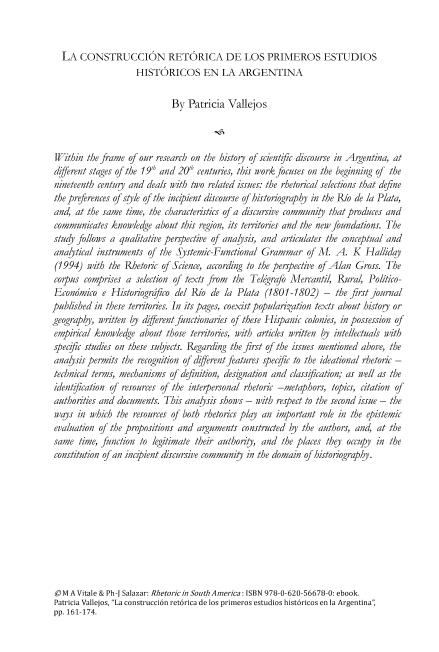Artículo
Entre las etapas que reconoce Basalla (1967) en referencia al comienzo de una ciencia nacional en distintos espacios del Nuevo Mundo, este trabajo se detiene en la etapa de la ciencia colonial, caracterizada por el investigador como un desarrollo local todavía dependiente (Cfr. Onna, 2000: 54). El objetivo es estudiar, en escritos de principios del siglo XIX sobre temas históricos y geográficos, las configuraciones retóricas que van perfilando la escritura de la historia.El trabajo explora las retóricas ideacional e interpersonal que intervienen en la construcción discursiva de estos temas, así como de los enunciadores que conforman una comunidad mixta que aporta en distinta medida a estos conocimientos. Con ello se pretende ampliar y profundizar nuestros estudios sobre la tradición discursiva de la historia como disciplina y su comunidad de discurso. Within the frame of our research on the history of scientific discourse in Argentina, at different stages of the 19th and 20th centuries, this work focuses on the beginning of the nineteenth century and deals with two related issues: the rhetorical selections that define the preferences of style of the incipient discourse of historiography in the Río de la Plata, and, at the same time, the characteristics of a discursive community that produces and communicates knowledge about this region, its territories and the new foundations. The study follows a qualitative perspective of analysis, and articulates the conceptual and analytical instruments of the Systemic-Functional Grammar of M. A. K Halliday (1994) with the Rhetoric of Science, according to the perspective of Alan Gross. The corpus comprises a selection of texts from the Telégrafo Mercantil, Rural, Político- Económico e Historiográfico del Río de la Plata (1801-1802) – the first journal published in these territories. In its pages, coexist popularization texts about history or geography, written by different functionaries of these Hispanic colonies, in possession of empirical knowledge about those territories, with articles written by intellectuals with specific studies on these subjects. Regarding the first of the issues mentioned above, the analysis permits the recognition of different features specific to the ideational rhetoric – technical terms, mechanisms of definition, designation and classification; as well as the identification of resources of the interpersonal rhetoric –metaphors, topics, citation of authorities and documents. This analysis shows – with respect to the second issue – the ways in which the resources of both rhetorics play an important role in the epistemic evaluation of the propositions and arguments constructed by the authors, and, at the same time, function to legitimate their authority, and the places they occupy in the constitution of an incipient discursive community in the domain of historiography.
La construcción retórica del conocimiento y sus productores en los inicios de la tradición discursiva de los estudios históricos en la Argentina
Fecha de publicación:
11/2013
Editorial:
Africa Rhetoric publishing
Revista:
African Yearbook of Rhetoric
ISSN:
2305-7785
Idioma:
Español
Tipo de recurso:
Artículo publicado
Clasificación temática:
Resumen
Archivos asociados
Licencia
Identificadores
Colecciones
Articulos(CCT - BAHIA BLANCA)
Articulos de CTRO.CIENTIFICO TECNOL.CONICET - BAHIA BLANCA
Articulos de CTRO.CIENTIFICO TECNOL.CONICET - BAHIA BLANCA
Citación
Vallejos, Patricia Silvia; La construcción retórica del conocimiento y sus productores en los inicios de la tradición discursiva de los estudios históricos en la Argentina; Africa Rhetoric publishing; African Yearbook of Rhetoric; 4; 2-3; 11-2013; 161-174
Compartir




